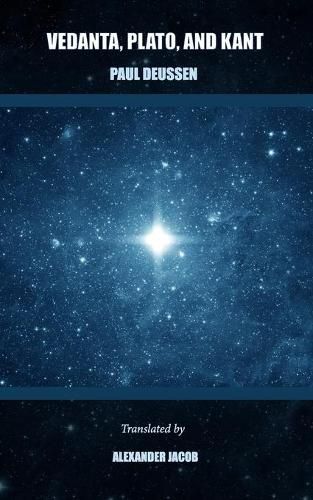Readings Newsletter
Become a Readings Member to make your shopping experience even easier.
Sign in or sign up for free!
You’re not far away from qualifying for FREE standard shipping within Australia
You’ve qualified for FREE standard shipping within Australia
The cart is loading…






The Kantian worldview, which always underlay all religion, philosophy, and art, could not have been the eternal truth if it did not emerge more or less clearly everywhere that the human mind penetrated into the depths, as this occurred, for example, in India through the Upanishads of the Vedas and the Vedanta based on them and in Greece through Parmenides and Plato. To consider both these phenomena in the light of the Kantian philosophy is the task that we have set ourselves here. - Paul Deussen Vednata, Plato, and Kant is a new translation. The book presents a defense of Shankara’s Advaita Vedanta philosophy as well as an elucidation of the Greek Idealistic doctrines of Parmenides and Plato. In all these schools of thought, Deussen detects a similar basic understanding of the world as a mere appearance distinct from Ideal Reality. He approximated this understanding to the Kantian notion of ‘things in themselves’ (Dinge-an-sich) and noted a degeneration of the original Vedic and Upanishadic worldview in the philosophies that followed, such as the Samkhya and Buddhism, just as there was a corruption of Parmenides’ doctrine of Being in the philosophy of his pupil Zeno. Similarly, he believes that Kant’s revolutionary Idealistic insights in Germany were also distorted by the post-Kantian thinkers and not generally understood in their original form except by Arthur Schopenhauer (1788-1860), who developed the doctrine of the world as a mere representation produced by the innate intuitive forms within the Intellect - Space, Time, and Causality.
Includes a preface by Alexander Jacob (Translator)
$9.00 standard shipping within Australia
FREE standard shipping within Australia for orders over $100.00
Express & International shipping calculated at checkout
The Kantian worldview, which always underlay all religion, philosophy, and art, could not have been the eternal truth if it did not emerge more or less clearly everywhere that the human mind penetrated into the depths, as this occurred, for example, in India through the Upanishads of the Vedas and the Vedanta based on them and in Greece through Parmenides and Plato. To consider both these phenomena in the light of the Kantian philosophy is the task that we have set ourselves here. - Paul Deussen Vednata, Plato, and Kant is a new translation. The book presents a defense of Shankara’s Advaita Vedanta philosophy as well as an elucidation of the Greek Idealistic doctrines of Parmenides and Plato. In all these schools of thought, Deussen detects a similar basic understanding of the world as a mere appearance distinct from Ideal Reality. He approximated this understanding to the Kantian notion of ‘things in themselves’ (Dinge-an-sich) and noted a degeneration of the original Vedic and Upanishadic worldview in the philosophies that followed, such as the Samkhya and Buddhism, just as there was a corruption of Parmenides’ doctrine of Being in the philosophy of his pupil Zeno. Similarly, he believes that Kant’s revolutionary Idealistic insights in Germany were also distorted by the post-Kantian thinkers and not generally understood in their original form except by Arthur Schopenhauer (1788-1860), who developed the doctrine of the world as a mere representation produced by the innate intuitive forms within the Intellect - Space, Time, and Causality.
Includes a preface by Alexander Jacob (Translator)